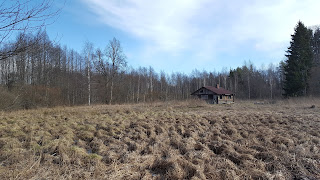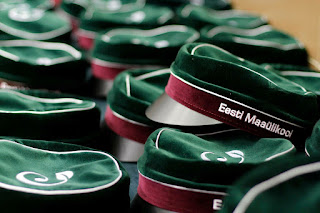Lockdown - part 2
My friend and I are both frustrated and exhausted. We make our way back to a spot where the phone reception is good enough to make a phone call. In an Estonian-English gibberish, I explain to the owner of the hut that we are lost. He promises to come find us and lead the way to the hut. When he finally arrives, it is already dark. He has brought wellies for me, a headlamp and hot apple juice. I change my boots, put on my own headlamp, and we follow him through the flooded forest. He is surprised himself about how much water there is, and at various points he too is unsure where to go. He has put wood on the ground of the “lake” and with the help of big wooden makeshift walking sticks, we make our way through. Shortly before the hut, we have to cross a river in the same fashion. Our home for the night is located on a clearing at the edge of the swamp, a pond nearby, and a toilet and some firewood can be found under some trees nearby.
“There is no key” the man explains, “because people throw in the window to get in. I’d rather thy use the door, even if they don’t pay rent.” He starts a fire and leaves. While my friend heats up the sauna, I bring in more wood and make a hole into the ice on the pond to carry water to the hut that we can use for washing and also boil to make it potable. The sauna doesn’t even get really hot before I fall asleep. And still I don’t know how I will get back home.
Again we sleep longer than intended. I go outside to cut some more wood. We have used up the last small pieces to heat up the hut this morning. The wood is frozen and it’s hard work. And after this noise of course we don’t have a chance to see any elk. And this would have been a spot where they are often seen, also it is the perfect season to watch them… at least the sun is shining today, so we have a wonderful walk through the bog, and also our clothes have dried overnight in the sauna (apart from my boots). Finally, we are happy: we are in Estonia, it is beautiful, and spring is coming!
And we even know how to find our way back to the car now.
While we pack our stuff, I see a stranger approaching. Without knocking, he enters. “Good morning”, I say in Estonian, which leads him to pour an Estonian monologue over me. Oh well, the downside of not showing much of an accent! I get that he is a nature photographer and came to hang up a picture. After doing so, he notices that something is wrong with me and I admit that I understand only about half of what he says. He switches to English, asking how we like it and if we have enough wood. I nod, and he leaves. He seems to be a friend of our host and has just walked one and a half hours through the swamp at eight in the morning, just to put up a picture.
As I close my backpack, I see him stop in front of our door again. I forgot to bring in the ax, which is now leaning against a piece of frozen wood. The stranger picks it up, chops all the wood that is left there, puts it back down and walks away.
In the car heading to Tartu, my friend and I discuss our misunderstandings and how to improve our communication, for we had very different expectations of this trip: she wanted to look for wildlife mainly, but I thought we were just going hiking. So in the end, we are all good again.
One little detour we have to make: Near Põltsamaa there is a place that I had been wanting to see for a long time. I am not sure if that is even possible – it is called Võisiku manor. I know it from Jaan Kross’ historical novel “The Czar’s Madman”. So we go there, and indeed, the original manor stands before us, next to the cemetery where the book’s protagonist (or rather, the real person behind it) is buried. It’s not a tourist attraction, though, but a home for the mentally ill.
Getting back to Tartu, we find the same insecurity that we have been feeling for the past two days: the world is upside down, the country in lockdown, nobody knows what to do next. The first vegan restaurant we head to, is still opened “Haven’t heard that we have to close yet”, the woman at the counter says and takes our order.
My friend leaves for Tallinn and I meet up with my old friend Madis. His girlfriend has had contact to a possibly infected person and is self-isolating – so I can’t sleep on their couch after all. But as always, Madis has a plan: some relative is abroad for a few months, so her apartment is empty and fully furnished. I am equipped with a big bag of food and the keys to a flat in a typical soviet block building: ugly on the outside, practical on the inside. And: central heating in these houses means central heating. To adjust the temperature, I have no other option but to open the window. To make myself useful, I clean the windows. The next morning, I take a walk through the empty streets of my favorite city. If I do encounter another person, they cross the street as soon as they see me. Grocery stores are open, but the bookstore I had wanted to visit is closed. I find a sunny spot in the botanical garden that has not yet come to life, and use my remaining mobile data to find a flight back home.
At last, I am on a bus back to Tallinn. There are two flights to Germany the next morning, and I will be at the airport early enough to catch the other one, if mine gets cancelled again. I get a notification that my exam is being pushed into the unknown. My entire class tries to change this: how are we supposed to start working this summer if we can’t graduate?
In Tallinn, again, nobody is eager to host me in these uncertain times, so I check into an almost empty hotel. Through my window I can see the spot where an important rebellion of Estonian peasants had taken place in 1343, the Uprising of Saint George’s night – also a popular tongue twister for foreigners: Jüriööülestõus. So shortly before five in the morning I cross the street to be tourist for a moment and stand in front of the memorial.
Hours later, as I arrive at home, everything has changed again: The exam will take place, they say, but special precautions will be taken. So I sit down at my desk, only to hear s few days later that the exam will not take place after all. Germany has now also closed its borders, and no more than 10 people are allowed to be in a room at the same time. So no exam, no graduation ceremony, and no party. There might be a complete lockdown, so I hop on a train to the countryside before that gets prohibited. If we are not allowed to leave the house, I would much rather spend this spring in the backyard with my parents than in a fourth floor apartment on Hanover. For two weeks, I isolate myself, just in case I caught the virus somewhere along the journey, train for the half marathon that will never take place, and get to write my last exam after all – in our living room, on my own computer. After that I write my first and, for the time being, only application. Adding a photo that was also taken in the living room.
And then I wait. Wait for information about the virus. Wait for the government to tell us what to do. When will we be allowed to meet our friends again? Our grandparents? I wait for my diploma and veterinary license that are not given to me in a ceremony by the university’s president, but sent by mail. And I wait to hear from the Estonian University of Life Sciences if I will get to do my PhD there.











Wer uber masterarbeit kaufen nachdenkt, achtet meist auf Qualitat und Diskretion. Eine saubere Argumentation, korrekte Quellenarbeit und ein klarer roter Faden sind hier besonders wichtig.
AntwortenLöschen